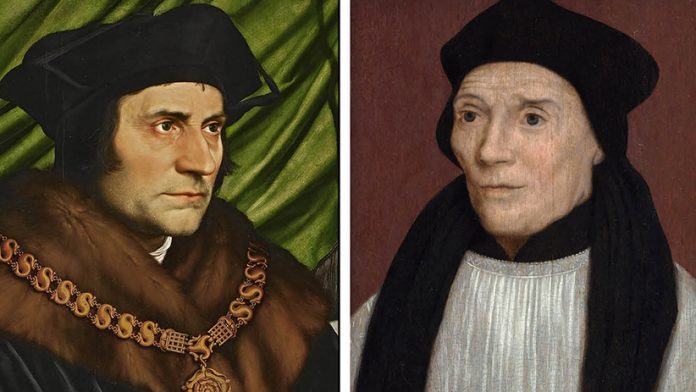
Today we commemorate Saint Thomas More, husband, father, lawyer, sometime chancellor of England, martyred in 1535 along with his compatriot Saint John Fisher, Bishop of Rochester and cardinal of the Church, who is remembered today also. In fact, although More’s head went under the headsman’s axe on July 6, it was Fisher who was put to death on this day, when they are both remembered. I suppose Cardinals first, Chancellors, second.
Both saints are martyrs of conscience (as are all martyrs, really, as John Paul II made clear in Veritatis Splendor) – put to death in odium fidei, in hatred of the Faith. More’s case made famous in the 1954 play by Robert Bolt, and the 1966 film, the martyr portrayed in immemorial fashion by the great Paul Scofield.
Thomas More saw the need for law, human law, but especially the divine law of God as embodied and instantiated in the Catholic Church, upon which all human law is – or should be – based. Without law, conscience becomes something unhinged and, ultimately, destructive. His sharp mind and soul perceived, at least in inchoate fashion, the hell that would be unleashed by his King, Henry VIII, in making conscience a purely subjective matter – the will of the King is the law, in Machiavellian fashion.
Most did not see, or refused to see, the evil. Every bishop in the land acquiesced to the King, signing the sacrilegious Oath of Supremacy – that Henry was ‘head of the Church in England’ – except one: The indomitable John Fisher, whose saintly ascetical life and courageous example should be a model for our bishops through the ages. He never rested easy: A learned and prayerful man, when past the age of fifty, although fluent in Latin, he thought he should learn Greek, so as to better understand Scripture – the wave of humanistic studies was waxing strong. As the Chinese adage has it, the best time to plant a tree is twenty years ago; the second best time, is today. And what holds for trees, holds for Greek (and the violin, as I am discovering).
Fisher also saw through the King’s machinations, which Henry could not stand: While in prison, Pope Paul III made the good bishop a cardinal, to which Henry replied, and I paraphrase from memory: Let the Pope send him the red hat, for head he shall have none to wear it! And, sure enough, John Fisher was beheaded on this day in 1535, going gallantly to his God.
Soon after Henry’s schism, we would have the Peace of Augsburg (1555), which enshrined the principle of cuius regio, eius religio, more or less, the religion of the prince is the religion of the land and, by extension, the people. Which means in practice that the prince can do more or less whatever he pleases. The rest of the hoi polloi would just have to follow along, under the deformed and seared conscience of the King, led along, in Henry’s case, by his lust and ambition. Merrie England, after Henry had separated from the Church, dissolved the monasteries, murdered or dispersed the monks and hoarded their wealth, was not so merrie; in fact, it became very sad, impoverished, even ruined, island, the churches ransacked, beggary and immorality rife, with a very few, very rich ignoble men ensuring that Catholicism would never return.
We are still living through the rippling and deleterious effects of the momentous rift begun with the schism of ‘King Harry’. As the future Pope Leo XIII would put it, without the one, true religion, no society can be well governed, and the further we drift from the Church, the worse off things will be.
The whole case of Henry’s quest for an annulment seems rather quaint to us now. If he had asked for his marriage to Catherine of Aragon to be declared null and void in today’s milieu, it would likely be handed to him on a silver platter, instead of the heads of More and Fisher.
But law is law, and marriage, marriage, and the Church, the Church. They all bind us in conscience in whatever age in which we live, as More so rightly and wisely saw. As he declared to his son-in-law Roper, who wanted to mow down the law to rebel against the King and his heinous henchmen:
William Roper: So, now you give the Devil the benefit of law!
Sir Thomas More: Yes! What would you do? Cut a great road through the law to get after the Devil?
William Roper: Yes, I’d cut down every law in England to do that!
Sir Thomas More: Oh? And when the last law was down, and the Devil turned ’round on you, where would you hide, Roper, the laws all being flat? This country is planted thick with laws, from coast to coast, Man’s laws, not God’s! And if you cut them down, and you’re just the man to do it, do you really think you could stand upright in the winds that would blow then? Yes, I’d give the Devil benefit of law, for my own safety’s sake!
The ‘benefit of law’. There is more to be said on that, but, for now, let us recall the witness of these two glorious martyrs, and the countless souls who would give their blood for the one true Faith, in England, and across the world.
Saints Thomas More and John Fisher, orate pro nobis!
